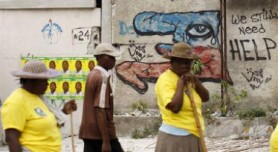PORT-AU-PRINCE (Reuters) – Haiti needs “more, better, different” assistance from the world, including significant private investment, if it is to have any hope of developing beyond the humanitarian crisis caused by the January 12 earthquake, the country’s prime minister said on Thursday.
Jean-Max Bellerive told Reuters that aid pledged so far by foreign governments and institutions would not be enough to meet the enormous challenges facing the crippled Caribbean state after the catastrophic natural disaster that killed up to 300,000 people and made some 1.3 million more homeless.
“I need more, I need better and I need it differently,” he said in a frank interview in which he thanked the world for its solidarity, while making clear that much more funding, both public and private, and greatly improved coordination of its delivery, was needed to help Haiti “build back better.”

“‘Build back better’ is tied to those three criteria. We have the plan, but now we need the means,” Bellerive said, adding that his small, quake-ravaged country, already one of the poorest states in the world, would be a critical test case of the real effectiveness of international aid.
At a meeting in New York in March, Bellerive said donors pledged $11 billion – more than originally announced — for Haiti’s post-quake reconstruction over 10 years, of which $5.3 billion was to be delivered over 2010-2011.
But he said many aid pledges factored in debt forgiveness or money already spent on Haiti’s humanitarian emergency.
He added the pledged funds were generous sums but when divided between Haiti’s 10 million inhabitants they added up to only a small per capita figure per year in the face of the daunting panoply of needs in education, health, infrastructure and agriculture development being confronted by the country.
Without a major new influx of foreign private investment — the “different” assistance Bellerive was seeking — the government and its relief partners risked using up the currently pledged funds just to cover the “humanitarian dramas” posed by having 1.3 million homeless quake survivors living in fragile tent camps across Port-au-Prince, he said.
Clearing the rubble from the quake alone would cost an estimated $1.2 billion, Bellerive said. He added that providing decent housing to each of the total 2 million quake homeless and chronically destitute could itself cost $10 billion – nearly the total being pledged by the international community for the full-blown national recovery and development program.
Unless this funds shortfall was addressed and a major influx of investment came, “I will have Haiti in the same situation, without food … without nothing and without any opportunity to create development,” Bellerive said.
He appealed for better coordination of aid, to take into account the government’s priorities. “How I am going to get that money?
What will be the channels you are going to use to send it? You have $50 million in Haiti, is it budget support, to finance a programme, or going through an NGO?” he said.
Bellerive repeated an oft-cited official complaint that hundreds of foreign NGOs operate in Haiti with no regard or accountability to the government.





